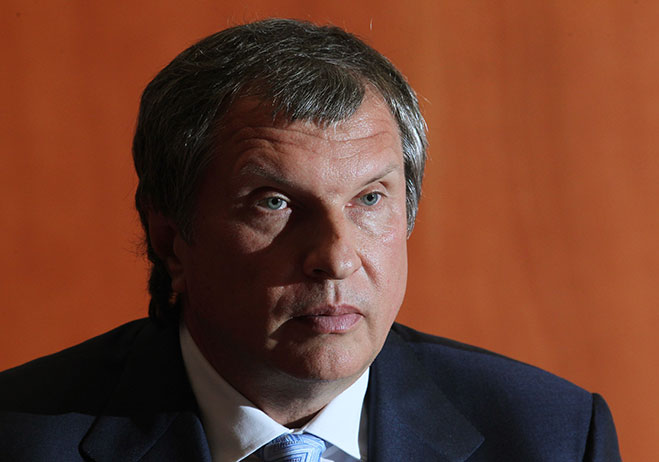
Like many suspected former KGB agents, there are vast chunks of Igor Sechin’s career that are somewhat of a mystery. Even after going on to serve as the Russian Federation’s deputy prime minister, wary US ambassadors would often joke that Sechin isn’t actually a real person, but an urban myth. Yet this year, the CEO is finding it increasingly difficult to operate from the shadows. In just a few years, he has successfully overseen a number of joint ventures and hostile takeovers that have launched Rosneft from near-obscurity to becoming the world’s single largest publicly traded oil company. The Observer has nicknamed Sechin ‘Darth Vader’ of Russian politics, while Russian political dissidents have branded him ‘the scariest man on Earth’. Friends call him an expansionist.
The scariest man on earth
Sechin’s early career is somewhat hazy. After graduating from Leningrad State University armed with a PhD in Economics and fluencies in both French and Portuguese, he is thought to have spent much of the 1980s working in Mozambique as a Soviet translator.
Leaked diplomatic cables suggest a far more sinister underlying profession – which has subsequently led political exiles to brand Sechin someone to avoid at all costs. Upon the collapse of the Soviet Union, he carried his tough-guy persona into the realm of Russian politics. From 1991 to 1996, he worked for the mayor of St Petersburg, before being handed over as an asset to the city’s then-deputy mayor: one Vladimir Putin. Sechin has been at Putin’s side ever since. He served as Putin’s chief of staff and deputy for several years in St Petersburg, and then rode the leader’s coattails into the Kremlin. There he was handed control of the general department of the main control directorate attached to the president, and served as Putin’s deputy after he was elected prime minister (and later, president). Yet Sechin’s official, subsidiary positions in Russia’s governing hierarchy underrate his true influence. It’s been said that he secretly dictated every aspect of Russian energy policy until 2008, and critics whisper he single-handedly orchestrated the demise of countless energy companies so as to consolidate his own emerging power as Russia’s premier oil man.
In 2004, Sechin was given the helm at the government’s oil firm, Rosneft. As its chairman, he has time and again used his sway in the Kremlin to expand Rosneft from a virtually unknown, state-owned company into one of the world’s most powerful. This began with a campaign to neutralise the competition – chiefly, Yukos. In 2003, oil producer Yukos was one of Russia’s top private companies until the Russian government decided to reassess Yukos’ finances. The government tried to pin its owner, oligarch Mikhail Khodorkovsky, with $26bn in back taxes. Yet because the government had already frozen his company’s assets, Khodorkovsky was unable to pay the demands. Yukos was declared bankrupt, and in 2006 the state auctioned off its assets. Rosneft purchased virtually all of them. In fact, one tiny company was actually bold enough to purchase one of Yukos’ subsidiaries before Rosneft was able to make a bid – so three days later, Sechin’s firm bought that company too. Europe’s Parliament condemned the takeover as ‘de facto nationalisation’, and an unjust personal attack against Khodorkovsky, who is still in jail. The acquisitions proved incredible for business.
Birth of a titan
Soon enough Rosneft officially became Russia’s top extraction and refinement company.
Sechin tripled its refinement capacity and expanded into China. Yet even then, he realised the limits of Rosneft’s state-controlled corporate structure. In order to correct this, he convinced the board to open up shares of the company to the public. In 2006, Rosneft placed almost 15 percent of its shares on the Russian Trading System and London Stock Exchange – and it turned out to be the fourth largest Initial Public Offering in history. The offering raised $10.7bn, and thrust Rosneft into the European spotlight. As with all of Sechin’s endeavours, the move wasn’t without controversy. Many investors tried to boycott the sale because they thought it imprudent that profits were not being reinvested in the state. That didn’t perturb him in the slightest. Over the next five years, he would go on to invest this money in expansive new ventures with the likes of BP and ExxonMobil. Major partnerships with the two oil giants were established for new deep sea ventures across the Arctic, in return for which Sechin was guaranteed shares in BP and access to oil fields in Texas and Alaska. The fact that he was simultaneously serving as Russia’s deputy PM only reinforced the Rosneft chairman’s reputation as one of Russia’s most ambitious business leaders.
Immediately after stepping down as deputy PM, Sechin was finally handed the job as Rosneft’s president and he wasted little time. Within weeks, he was jetting across the globe personally overseeing his next prize – TNK-BP. A large-scale partnership between BP and Russian oil competitor AAR, TNK-BP was Russia’s third largest oil producer, worth over $60bn. In March, he finally sealed the deal in his quest to buy a controlling share in the venture by offering $55bn in shares and cash. Overnight, Rosneft officially became the world’s largest publicly traded oil company – an incredible rise to power that analysts pin on the guile of Sechin alone. Not only can he be singlehandedly credited with overseeing Russia’s biggest acquisition deal in history, but he constantly protected Rosneft from the threats of competitors like Gazprom throughout. Sechin’s fearsome appetite for expansion has seen Rosneft’s revenue surpass the $100bn mark, and that figure is only expected to rise. He now oversees 106,000 employees, and controls the valves to much of the world’s oil supply. Whether he truly is the scariest man on Earth remains to be seen, but one thing is certain: Igor Sechin is no longer a man in the shadows.

